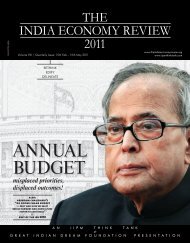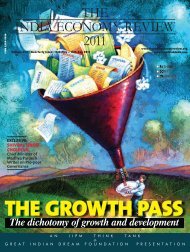Download - The India Economy Review
Download - The India Economy Review
Download - The India Economy Review
Create successful ePaper yourself
Turn your PDF publications into a flip-book with our unique Google optimized e-Paper software.
P LANNING P ARADIGM<br />
paign in 1992: ‘It is economy, stupid’.<br />
Second, denounce such simplifi cation and<br />
let planning acknowledge ideologies more<br />
seriously. In the <strong>India</strong>n context, the sec-<br />
ond approach has more worth since plan-<br />
ning has taken issues of inequality and<br />
poverty, which requires differential treat-<br />
ment of different groups. <strong>India</strong> has not<br />
seen individuals like Bismark in Germany<br />
or Beveridge in the United Kingdom, i.e.,<br />
those who have made practical application<br />
of the social rights through policy instru-<br />
ments in those countries. But, Planning<br />
Commission has fi lled this void to some<br />
extent. Chelliah (2007) has shown in a<br />
paper how Planning Commission could<br />
undertake the responsibility for develop-<br />
ing backward states through differential<br />
policy prescriptions. This differential<br />
policy prescription (see chapter 4 of Sachs<br />
[2005] or Galbraith [1972] for more de-<br />
tails), which is primarily an equity-based<br />
argumentation could be effective only<br />
when ideologies have been taken seri-<br />
ously. What is the nature of planning when<br />
ideologies are taken more seriously?<br />
Planning in Interactive Contexts<br />
Charles E. Lindblom (1977), in his famous<br />
Politics and Markets, showed how intel-<br />
lectually guided ‘decision’ and so-<br />
cially guided ‘volition’ are two<br />
modes of reaching solutions: “<strong>The</strong><br />
14 THE IIPM THINK TANK<br />
Persuasion is demystifying the<br />
impossibility of means-ends dichotomy<br />
and releasing the power of ideas<br />
model of the intellectually guided society,<br />
Model 1, specifi ed that some people in the<br />
society are wise and informed enough to<br />
ameliorate its problems and guide social<br />
change with a high degree of success. Ac-<br />
cording to Model 2, however, ‘everyone<br />
well knows himself to be falliable’, as J. S.<br />
Mill argued in “On Liberty.” While in the<br />
Model 2 interaction becomes part of the<br />
decision making. In the process of interaction<br />
to reach an agreement persuasion or<br />
bargaining or coercion takes place. A<br />
healthy democracy should aspire to carry<br />
out the role of persuasion to a great extent,<br />
which could ensure deepening of the democracy<br />
as well.<br />
Persuasion is not merely about reasoned<br />
arguments and backing with evidence,<br />
but also winning the other comprehensively,<br />
even by appealing to values.<br />
“Power has a rationality that rationality<br />
does not know, whereas rationality does<br />
not have a power that power does not<br />
know” (Flyvberg, 1998: 2). Persuasion with<br />
reasoned arguments alone is the voice of<br />
the experts. Ethnographic revelations<br />
about such expert-led planning have been<br />
scandalous, and has been moderately<br />
criticized as ‘anti-politics machine’ (Ferguson,<br />
1994). Such anti-politics machine<br />
of planning also initially sidelines the<br />
ideational frame of social change by effectively<br />
blocking the new ideas on the<br />
periphery. Good example is to look at how<br />
most of the grandeous plans have ignored<br />
the way social and structural processes<br />
producing poverty at local level. A slowly,<br />
but steadily, growing stream of literature<br />
on social structures of accumulation in<br />
<strong>India</strong>, has shown how both planning process<br />
as well as market is entrenched in the<br />
social structures. Such entrenchment retards<br />
the development of a liberal capitalism,<br />
as well as threatens the fabric of democracy<br />
by stifl ing the voices which have<br />
limited economic resources.<br />
Persuasion is the ability to take cognizance<br />
of such different voices and to allow<br />
intellectual space not to stifl e new ideas.<br />
“Practical men, who believe themselves to<br />
be quite exempt from any intellectual infl<br />
uence, are usually the slaves of some<br />
defunct economist.” (Keynes 1936: 383).<br />
A persuasive planner could act as a policy<br />
entrepreneur. A policy entrepreneur is<br />
engaged in streamlining the problems and<br />
solutions to the political environment.<br />
Technically, this process is called as ‘opening<br />
of policy windows’ (Kingdon 1995;<br />
Roberts & King, 1991). Properties of problems<br />
in pluralist democracies are often<br />
‘constructed’ than given. Solutions are





